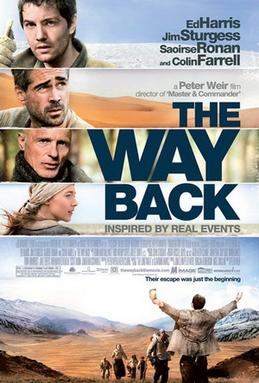I thought “the Way Back” would be just an adventure movie. It was interesting from the adventure point of view, but I thought it was even more interesting from the point of view of politics & heroism.

The main character is a Polish officer captured by the Soviets after they and the Nazis divided the country between them in 1939. The Soviets massacred many Polish officers at place like Katyn forest, so that he escaped alive was an achievement. It was a terrible time in Poland and not very good in the world in general. It sometimes seemed that the world would be divided between totalitarian communist or totalitarian Nazis, with lots of petty tyrants mixed in but not much space left for freedom. In the movie, the communists throw the guy into a Gulag on the usual communist style charges. There are scenes of the brutality. The main character and some others escape and walk all the way across Asia from Siberia to India.
It has been more than twenty years since communist collapsed in Europe and Poland led the way to freedom. The horrors of communism have faded from popular memory. It is almost impossible to believe it really happened at all. Whole populations exterminated, people thrown into camps because of their associations, class origins or just for no real reason at all. The wars of the 20th Century were bloody with industrial strength, which makes it even more astonishing that more people died from the murderous internal oppression of revolutionary socialism, like communism and its cousin Nazism, than in all the battle associated deaths. When the world started to wake up from that long nightmare, when the Berlin Wall fell and freedom returned to large parts of the world, our joy at the events allowed us to put aside some of the horrible memory. Few Americans have ever experienced anything even remotely like the horrors of the Soviet Union, but it is important sometimes to recall the carnage and suffering committed in the name of progress toward totalitarian utopias.
We like to think that the human race has grown past this kind of thing. People living in just societies in peaceful times can feel that way. History gets sanitized. But the study of history informs us that it good times represent just pushing back the wilderness, in limited times and geography. The demons still lurk out there and even within. World War I opened the door for lots of them and in many ways Lenin, Hitler, Stalin & Mao were made possible by the monumental disruption in the world order. With the passage of time, some of these events and personalities seem less pernicious; they become stereotypical characters, and their murderous henchmen, like Leon Trotsky or Che Guevara can even acquire a kind of radical chic.
No matter the other merits of the movie, it helped me remember both the horror and the heroism of those who resisted tyranny and ultimately brought it down and also the dangers of revolutionary change. The mostly peaceful general collapse of communism in Eastern Europe may have made us too optimistic. In a place like Poland, it happened smoothly as power moved to a well-prepared and civilized opposition. Despite the past, there were no significant reprisals. As I write this, we are witnessing potential revolutions in the Middle East. I don’t know the details and I certainly cannot predict the future. But I am afraid that behind the revolutions there, there is no Geremek, Onyszkiewicz, Mazowiecki or Wałęsa. I am not sure what the historical analogy will be. When the Iranians knocked down the Shah, worse and more persistent tyranny followed. Just knocking down tyranny is not enough. Some will be there to pick up the pieces. Good does not always get there first with the most. The good people are not always the best organized and the violence, exhilaration and power associated with revolution can corrupt even the best people.
There is no solution to this or a formula that will work all the time. In the times of wrenching change, a lot depends on personalities and luck. Would our post-revolution been so successful w/o men like George Washington? If the Germans had not “imported” Lenin back into Russia, might their revolution been more moderate and less horrible? The farther we get from events, the more they seem to have been destined to unfold as they did, but nothing is determined.
Returning to the prosaic, “the Way Back” is a good movie, worth going to see. You can enjoy it as an adventure film and a tale of adversity & triumph and if it makes you think, so much the better. Colin Ferrell does a great job of playing a murderously dangerous and dumb but somehow likable man. Ed Harris always does a good job. And Jim Stugess, who plays the Polish officer in the main role, portrays an honorable and determined man in an almost impossibly challenging position. See the movie.
